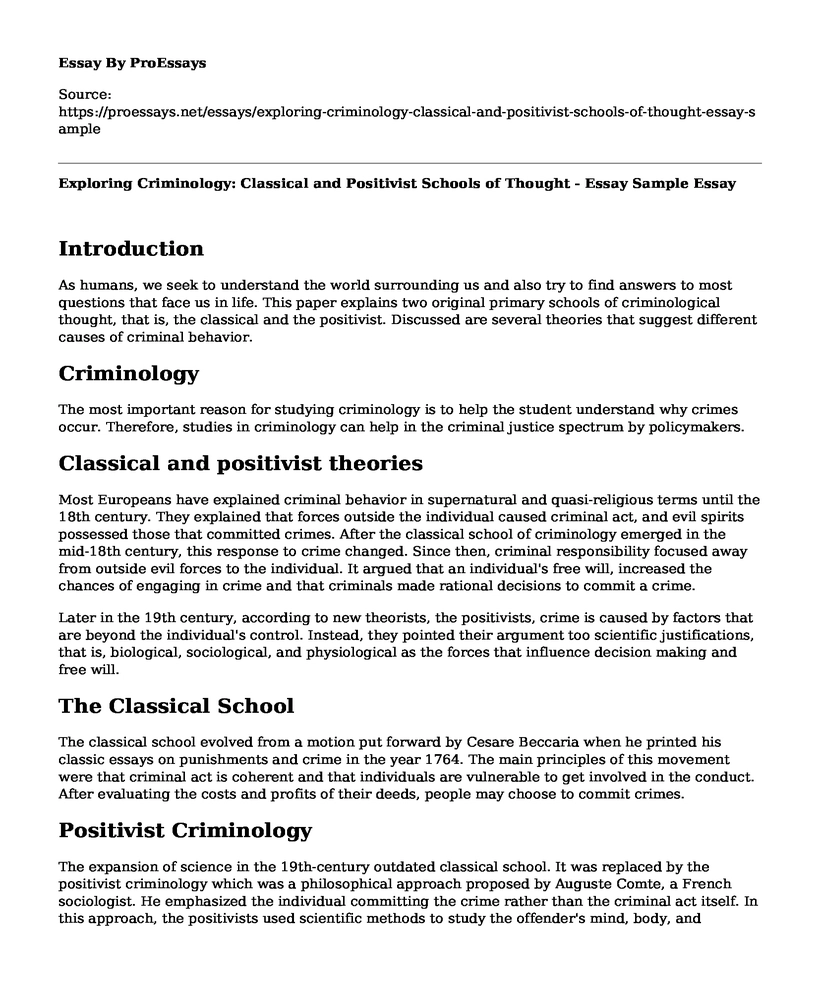Introduction
As humans, we seek to understand the world surrounding us and also try to find answers to most questions that face us in life. This paper explains two original primary schools of criminological thought, that is, the classical and the positivist. Discussed are several theories that suggest different causes of criminal behavior.
Criminology
The most important reason for studying criminology is to help the student understand why crimes occur. Therefore, studies in criminology can help in the criminal justice spectrum by policymakers.
Classical and positivist theories
Most Europeans have explained criminal behavior in supernatural and quasi-religious terms until the 18th century. They explained that forces outside the individual caused criminal act, and evil spirits possessed those that committed crimes. After the classical school of criminology emerged in the mid-18th century, this response to crime changed. Since then, criminal responsibility focused away from outside evil forces to the individual. It argued that an individual's free will, increased the chances of engaging in crime and that criminals made rational decisions to commit a crime.
Later in the 19th century, according to new theorists, the positivists, crime is caused by factors that are beyond the individual's control. Instead, they pointed their argument too scientific justifications, that is, biological, sociological, and physiological as the forces that influence decision making and free will.
The Classical School
The classical school evolved from a motion put forward by Cesare Beccaria when he printed his classic essays on punishments and crime in the year 1764. The main principles of this movement were that criminal act is coherent and that individuals are vulnerable to get involved in the conduct. After evaluating the costs and profits of their deeds, people may choose to commit crimes.
Positivist Criminology
The expansion of science in the 19th-century outdated classical school. It was replaced by the positivist criminology which was a philosophical approach proposed by Auguste Comte, a French sociologist. He emphasized the individual committing the crime rather than the criminal act itself. In this approach, the positivists used scientific methods to study the offender's mind, body, and environment.
Conclusion
Based on the above theories about the causes of crime, it is evident that crime is a behavior that individuals engage in to fulfill their sociological and physiological desires. It also shows that one's environment can influence his/her participation in crime, hence criminals are made and not born
References
Beccaria, C. (1991). Dei delitti e delle pene (1764). Milan: Feltrinelli.
Comte, A. (1858). The positive philosophy of Auguste Comte. Blanchard.
Morice, G. T. (1926). Are Criminals Born or Made. S. African LJ, 43, 122.
Peak, K. J. (1998). Justice administration. Upper Saddle River, NJ: Prentice Hall.
Peak, K. J., & Madensen-Herold, T. D. (2019). Introduction to criminal justice: Practice and process. SAGE Publications, Incorporated.
Cite this page
Exploring Criminology: Classical and Positivist Schools of Thought - Essay Sample. (2023, Apr 05). Retrieved from https://proessays.net/essays/exploring-criminology-classical-and-positivist-schools-of-thought-essay-sample
If you are the original author of this essay and no longer wish to have it published on the ProEssays website, please click below to request its removal:
- Mass Incarceration in the United States Essay
- Stricter Gun Laws Could Prevent Mass Shootings Essay
- Essay Sample on Anti-black Paranoia
- Cybercrime: Local to Global Essay Example
- Americans' Changing Attitudes Toward Marijuana Legalization - Essay Sample
- Essay Example on Supreme Court Judgments: Federal Govt. & States Relationship
- Essay on U.S. Incarceration: Rising Crime, War on Drugs, and Shifting Attitudes







